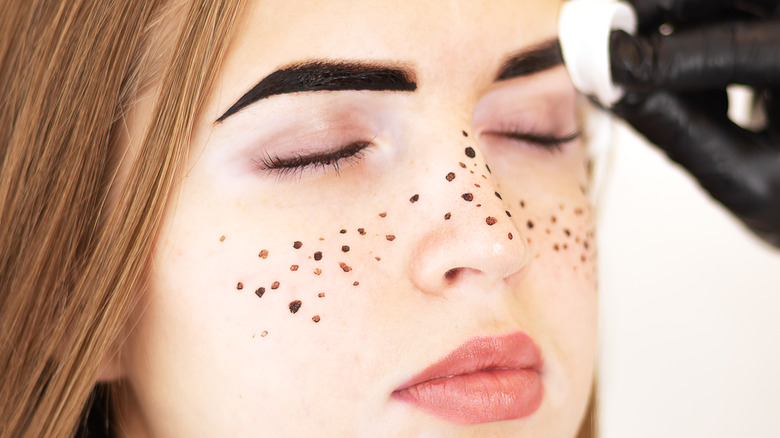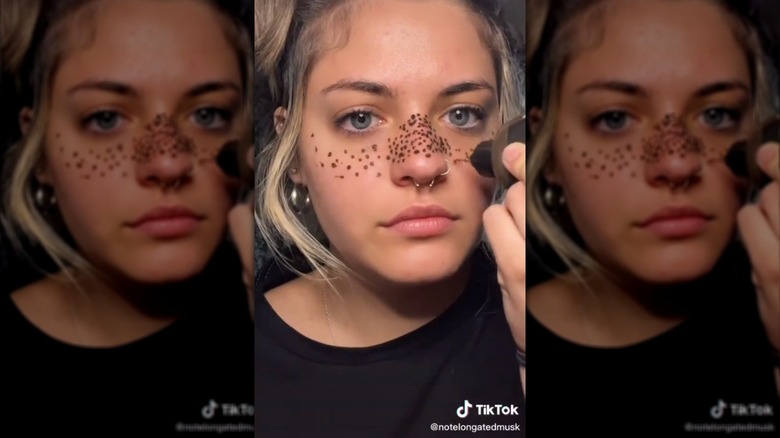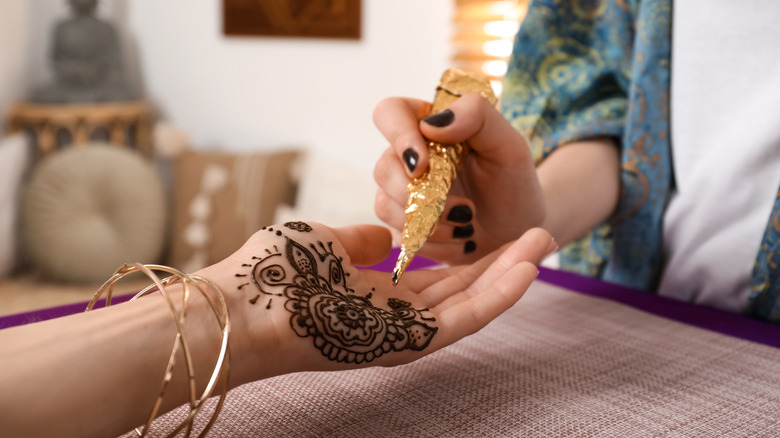The Reason We Want To Leave Henna Tattoo Freckles In The Past
Those with natural freckles may be perplexed to learn that faux freckles are a pretty big beauty trend that has been around for a few years. Since the launch of the first-ever freckle applicator in 2017, aesthetically placed freckles have only become more widespread through social media, per Repeller.
TikTok seems to be a hub for such beauty trends, with Allure tracing the recent rise of henna freckles to the app. Through this hack, users have been applying natural-looking sunspots that are more durable than regular makeup but aren't as long-lasting as tattooed freckles.
If you're unfamiliar, henna is a dark paste made from the henna plant, also known as "Lawsonia inermis," via How Stuff Works. The aesthetic use of henna has been traced back thousands of years ago, originating in Africa and the Middle East.
Henna tattooing is the practice of body painting that is observed in many cultures and religions. As explained on Aroha International, henna tattooing is common in India, where it is also called mehndi, and is often used for Hindu wedding ceremonies.
With this important context in mind, it's time to note the reasons we're ready to leave henna freckles in the past.
Experts point out the risks of using henna to achieve long-lasting freckles
Some of the primary concerns around the henna tattoo freckle trend relate to the potential health risks of applying henna to the face. For one, there are different types of henna, some of which aren't safe for the skin.
According to henna artist Zoiya Wahidi, "There are many kinds of henna such as red henna and black henna — both of which are extremely harmful to use on skin. They contain chemicals such as p-phenylenediamine (PPD) which can severely burn the skin and leave life-long burn marks," per Ipsy.
Allure adds that using the wrong type of henna can cause an allergic reaction, such as inflammation, itching, or oozing. In this way, selecting the correct kind of henna is essential, but even then there is still a risk if you have sensitive skin. Experts recommend only using henna with natural and organic ingredients, but it's also important to perform a patch test before applying henna to the face.
When there are so many other ways to create the faux freckle look, it makes sense why we're particularly weary of this method that potentially poses a health risk, especially with the number of "henna tattoo freckles gone wrong" videos on TikTok.
Some creators see henna freckles as misusing a culturally significant practice
The potential risks of henna freckles are not the only reason we're ready to leave the trend in the past, as some creators believe that using henna for such purposes disregards its cultural significance. As mentioned, the use of henna has a long and significant history in some Middle Eastern and African cultures and is still used in celebrations and ceremonies by many, per How Stuff Works.
Some South Asian creators spoke to Insider about the emerging use of henna to achieve an aesthetic look most associated with whiteness, explaining that the practice is just one of many on social media that takes from people of color without acknowledging or appreciating its origin.
Some creators allege that allergic reactions to and misapplications of henna freckles would be avoided if white creators properly educated themselves about henna and listened to creators of color who have experience with the substance. This can be seen in the TikTok from user @jazzmined, who duetted a video of henna freckles gone wrong.
It's important to note that not all individuals who come from cultural backgrounds that traditionally use henna are convinced that the freckle trend is a form of appropriation, as seen in this Reddit discussion. While the debate is ongoing, we're ready to leave the henna tattoo trend in the past and stick to less risky methods of applying faux freckles instead.


